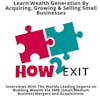E185: Mid-market M&A Advisory Services in a Changing Economic Landscape with Steve Conwell - Watch Here
About the Guest(s):
Steve Conwell is a co-founder of Final Ascent, a mid-market M&A advisory firm specializing in exit planning and succession strategies. With a background in audit and entrepreneurship, Steve brings a wealth of experience to his role as an advisor and coach for businesses preparing for sale. He has a deep understanding of the M&A market and helps clients navigate the complexities of the process to maximize their value and achieve a successful exit.
Episode Summary:
In this episode, Ronald Skelton interviews Steve Conwell, co-founder of Final Ascent, about the current state of the M&A market and what business owners need to know when preparing to sell their companies. Steve shares insights into the macro and microeconomic factors affecting mergers and acquisitions, including the impact of inflation, interest rates, and geopolitical events. He emphasizes the importance of being proactive in exit planning and building a valuable company that will attract multiple buyers. Steve also discusses the changing behavior of buyers in the mid-market space and the need for sellers to be cautious and well-prepared throughout the process.
Key Takeaways:
- The M&A market is influenced by various macro and microeconomic factors, including inflation, interest rates, and geopolitical events. Business owners should stay informed about these factors and be prepared for potential changes in the market.
- Buyers in the mid-market space are becoming more cautious and are looking for stable businesses with a strong competitive advantage. They are focused on the quantitative and qualitative aspects of a company's performance and its potential for growth.
- Sellers should start the exit planning process early and work with experienced advisors to maximize the value of their companies. It is important to understand the buyer's perspective and present the business in the best possible light.
- Building a valuation edge and saturation-proofing the business are key strategies for attracting buyers and maximizing value. Sellers should differentiate themselves from the competition and ensure their business is well-positioned for growth.
- Sellers should be cautious when making changes to the business before selling. Buyers prefer stability and may be hesitant to acquire a company that has undergone significant changes. It is important to maintain a positive rapport with employees and listen to their feedback during the transition.
Notable Quotes:
- "Good companies in any market will sell. When you're building a company, you want to very early in the process start to sell because you're going to transition at some point and at some stage." - Steve Conwell
- "Buyers like to buy businesses that are thriving, not surviving. You want to present yourself in the best light possible so that they go, 'Yes, I want to pick you.'" - Steve Conwell
Article:
The Art of Selling a Business: Insights from M&A Advisor Steve Conwell
Key Takeaways:
- The current economic landscape is uncertain, with factors such as inflation, rising interest rates, and geopolitical tensions affecting the mergers and acquisitions (M&A) market.
- Buyers are becoming more cautious and are looking for stable businesses with a strong competitive advantage.
- Sellers should focus on building a valuation edge by differentiating themselves from the competition and ensuring their financials are in order.
- It is crucial for business owners to start planning their exit strategy early and work with experienced advisors to maximize the value of their company.
Evaluating the Market and Buyer Behavior
The M&A market is constantly evolving, influenced by various macroeconomic factors. According to Steve Conwell, an M&A advisor at Final Ascent, the market has seen a shift in buyer behavior due to recent economic changes. Banks are becoming more cautious and are looking for a 50-50 funding arrangement, which has led to a decrease in multiples and a more rigorous due diligence process.
Buyers are now focusing on the qualitative aspects of a business, such as its unique product or service, strong financial statements, and a well-structured management team. They want to ensure that the business has a defendable mode against competition and is not heavily reliant on a single customer. By evaluating these factors, buyers can mitigate risk and make informed decisions.
The Importance of Thriving, Not Surviving
Buyers are more inclined to acquire businesses that are thriving rather than just surviving. They want to see consistent growth in revenue and net profits, as well as a strong track record of performance. Sellers should aim to present their company in the best possible light by highlighting their unique value proposition and demonstrating their ability to maintain growth.
Conwell emphasizes the need for sellers to evaluate their competition regularly. By understanding what their competitors are doing well and where they can improve, sellers can position themselves as industry leaders and maintain a valuation edge. Additionally, sellers should saturation-proof their business by identifying and addressing potential market saturation issues.
The Role of Advisors and Tax Planning
Conwell stresses the importance of working with experienced advisors early in the process. They can provide valuable insights and guidance on tax minimization strategies, ensuring that sellers maximize their after-tax proceeds. By structuring the business and its financials in a tax-efficient manner, sellers can potentially save millions of dollars.
One tax strategy that sellers should consider is the Qualified Small Business Stock (QSBS) exemption. By meeting certain criteria, sellers can qualify for a $10 million tax exemption on the sale of their business. However, it is crucial to consult with a tax advisor and ensure that the necessary requirements are met.
Conclusion
Selling a business is a complex process that requires careful planning and execution. By understanding the current market dynamics, evaluating their competition, and working with experienced advisors, sellers can position themselves for a successful exit. It is essential to focus on building a valuation edge and maintaining consistent growth to attract buyers and maximize the value of the business. With proper preparation and strategic decision-making, sellers can achieve a lucrative exit and secure their financial future.
---- MORE COOL STUFF ---
Are you ready to take your podcast listening to the next level? Subscribe to "DEEPER by How2Exit" newsletter and never miss out on our latest episodes. Join our newsletter HERE
Want to stay in touch with what's happening in the Main Street M&A Space? Subscribe to Growth & Acquisitions(Formerly The Hub)








